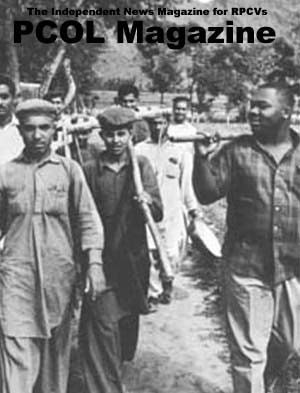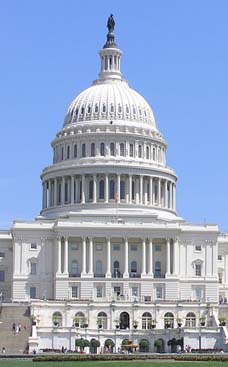2006.12.06: December 6, 2006: Headlines: Boomers: Volunteerism: Recruitment: Washington Times: Baby Boomers seen as source of global volunteers
Peace Corps Online:
Peace Corps News:
Peace Corps Library:
Recruitment:
Peace Corps: Recruitment :
The Peace Corps and Recruitment:
2006.12.06: December 6, 2006: Headlines: Boomers: Volunteerism: Recruitment: Washington Times: Baby Boomers seen as source of global volunteers
Baby Boomers seen as source of global volunteers

According to the Washington University center, nearly 1 million Americans volunteered abroad at least once in 2005, most of them for two weeks or less. Young people ages 15 to 24 were the most frequent international volunteers, followed by those ages 35 to 44. Top volunteer activities included teaching; mentoring youth; general labor; fundraising; working with food, clothing or crafts; and providing professional or management assistance. "I believe Americans want to do a lot more [international volunteering], but they need to be pointed in the right direction," said Robert Mallett, president of Pfizer Foundation. Government, nongovernmental organizations, businesses and nonprofit agencies can't improve quality of life for others by themselves, but can accomplish a lot if they do so as partners. "There are a lot of former revolutionaries who are retiring in their 50s and have tremendous skill sets to offer," said Sen. Norm Coleman, Minnesota Republican, "and they want to make the most of the second half of their longer life spans."
Baby Boomers seen as source of global volunteers
Baby boomers seen as source of global volunteers
By Cheryl Wetzstein
THE WASHINGTON TIMES
December 6, 2006
Volunteer agencies were urged yesterday to tap into the pool of aging and retiring baby boomers at a forum on international volunteerism at the Brookings Institution.
"There are a lot of former revolutionaries who are retiring in their 50s and have tremendous skill sets to offer," said Sen. Norm Coleman, Minnesota Republican, "and they want to make the most of the second half of their longer life spans."
He cited the exhortation of President Kennedy's inaugural address: "Ask not what your country can do for you; ask what you can do for your country."
The senator exhorted business firms to expand their support and "shared vision" for volunteerism and urged Congress to increase funding for government volunteer programs, such as the Peace Corps.
Rep. James T. Walsh, New York Republican and former Peace Corps volunteer to Nepal, voiced similar sentiment.
"There is a deep vein in our country for volunteerism."
The goal of the Brookings initiative is to double international volunteerism in three years, from 50,000 people to 100,000 people. Margaret Sherraden, researcher at the Center for Social Development at Washington University in St. Louis, said relatively little is known about international volunteerism.
According to the Washington University center, nearly 1 million Americans volunteered abroad at least once in 2005, most of them for two weeks or less.
Young people ages 15 to 24 were the most frequent international volunteers, followed by those ages 35 to 44. Top volunteer activities included teaching; mentoring youth; general labor; fundraising; working with food, clothing or crafts; and providing professional or management assistance.
"I believe Americans want to do a lot more [international volunteering], but they need to be pointed in the right direction," said Robert Mallett, president of Pfizer Foundation.
Government, nongovernmental organizations, businesses and nonprofit agencies can't improve quality of life for others by themselves, but can accomplish a lot if they do so as partners.
"Thousands of people working for companies like mine want to be agents of change," Mr. Mallett said. "They have the skills. They have passion. They have the moral compass, just like you. They only lack the secure opportunity."
Brookings plans an international volunteerism conference next spring, and former Presidents George H.W. Bush and Bill Clinton will be asked to participate. If they do, said Robert Pastor, vice president for international affairs at American University, a number of universities will join them.
Links to Related Topics (Tags):
Headlines: December, 2006; Baby Boomers; Recruitment
When this story was posted in December 2006, this was on the front page of PCOL:





Peace Corps Online The Independent News Forum serving Returned Peace Corps Volunteers
 | All Volunteers Safe in Fiji
All Volunteers in Fiji are safe and accounted for. The Peace Corps is monitoring the situation very closely. Volunteers are on standfast but there are no plans for evacuation at this time. Peace Corps is working closely with the US embassy and with host country partners to monitor the situation. Peace Corps is confident that volunteers are not in harm's way. The military seized control of Fiji on December 5 after weeks of threats. Subscribe to our news feed to read the latest breaking news. |
 | Ron Tschetter in Morocco and Jordan
On his first official trip since being confirmed as Peace Corps Director, Ron Tschetter (shown at left with PCV Tia Tucker) is on a ten day trip to Morocco and Jordan. Traveling with his wife (Both are RPCVs.), Tschetter met with volunteers in Morocco working in environment, youth development, health, and small business development. He began his trip to Jordan by meeting with His Majesty King Abdullah II and Her Majesty Queen Rania Al Abdullah and discussed expanding the program there in the near future. |
 | Chris Dodd's Vision for the Peace Corps
Senator Chris Dodd (RPCV Dominican Republic) spoke at the ceremony for this year's Shriver Award and elaborated on issues he raised at Ron Tschetter's hearings. Dodd plans to introduce legislation that may include: setting aside a portion of Peace Corps' budget as seed money for demonstration projects and third goal activities (after adjusting the annual budget upward to accommodate the added expense), more volunteer input into Peace Corps operations, removing medical, healthcare and tax impediments that discourage older volunteers, providing more transparency in the medical screening and appeals process, a more comprehensive health safety net for recently-returned volunteers, and authorizing volunteers to accept, under certain circumstances, private donations to support their development projects. He plans to circulate draft legislation for review to members of the Peace Corps community and welcomes RPCV comments. |
 | He served with honor
One year ago, Staff Sgt. Robert J. Paul (RPCV Kenya) carried on an ongoing dialog on this website on the military and the peace corps and his role as a member of a Civil Affairs Team in Iraq and Afghanistan. We have just received a report that Sargeant Paul has been killed by a car bomb in Kabul. Words cannot express our feeling of loss for this tremendous injury to the entire RPCV community. Most of us didn't know him personally but we knew him from his words. Our thoughts go out to his family and friends. He was one of ours and he served with honor. |
 | Peace Corps' Screening and Medical Clearance
The purpose of Peace Corps' screening and medical clearance process is to ensure safe accommodation for applicants and minimize undue risk exposure for volunteers to allow PCVS to complete their service without compromising their entry health status. To further these goals, PCOL has obtained a copy of the Peace Corps Screening Guidelines Manual through the Freedom of Information Act (FOIA) and has posted it in the "Peace Corps Library." Applicants and Medical Professionals (especially those who have already served as volunteers) are urged to review the guidelines and leave their comments and suggestions. Then read the story of one RPCV's journey through medical screening and his suggestions for changes to the process. |
 | The Peace Corps is "fashionable" again
The LA Times says that "the Peace Corps is booming again and "It's hard to know exactly what's behind the resurgence." PCOL Comment: Since the founding of the Peace Corps 45 years ago, Americans have answered Kennedy's call: "Ask not what your country can do for you--ask what you can do for your country. My fellow citizens of the world: ask not what America will do for you, but what together we can do for the freedom of man." Over 182,000 have served. Another 200,000 have applied and been unable to serve because of lack of Congressional funding. The Peace Corps has never gone out of fashion. It's Congress that hasn't been keeping pace. |
 | PCOL readership increases 100%
Monthly readership on "Peace Corps Online" has increased in the past twelve months to 350,000 visitors - over eleven thousand every day - a 100% increase since this time last year. Thanks again, RPCVs and Friends of the Peace Corps, for making PCOL your source of information for the Peace Corps community. And thanks for supporting the Peace Corps Library and History of the Peace Corps. Stay tuned, the best is yet to come. |
 | History of the Peace Corps
PCOL is proud to announce that Phase One of the "History of the Peace Corps" is now available online. This installment includes over 5,000 pages of primary source documents from the archives of the Peace Corps including every issue of "Peace Corps News," "Peace Corps Times," "Peace Corps Volunteer," "Action Update," and every annual report of the Peace Corps to Congress since 1961. "Ask Not" is an ongoing project. Read how you can help. |
Read the stories and leave your comments.

Some postings on Peace Corps Online are provided to the individual members of this group without permission of the copyright owner for the non-profit purposes of criticism, comment, education, scholarship, and research under the "Fair Use" provisions of U.S. Government copyright laws and they may not be distributed further without permission of the copyright owner. Peace Corps Online does not vouch for the accuracy of the content of the postings, which is the sole responsibility of the copyright holder.
Story Source: Washington Times
This story has been posted in the following forums: : Headlines; Boomers; Volunteerism; Recruitment
PCOL35371
93



















